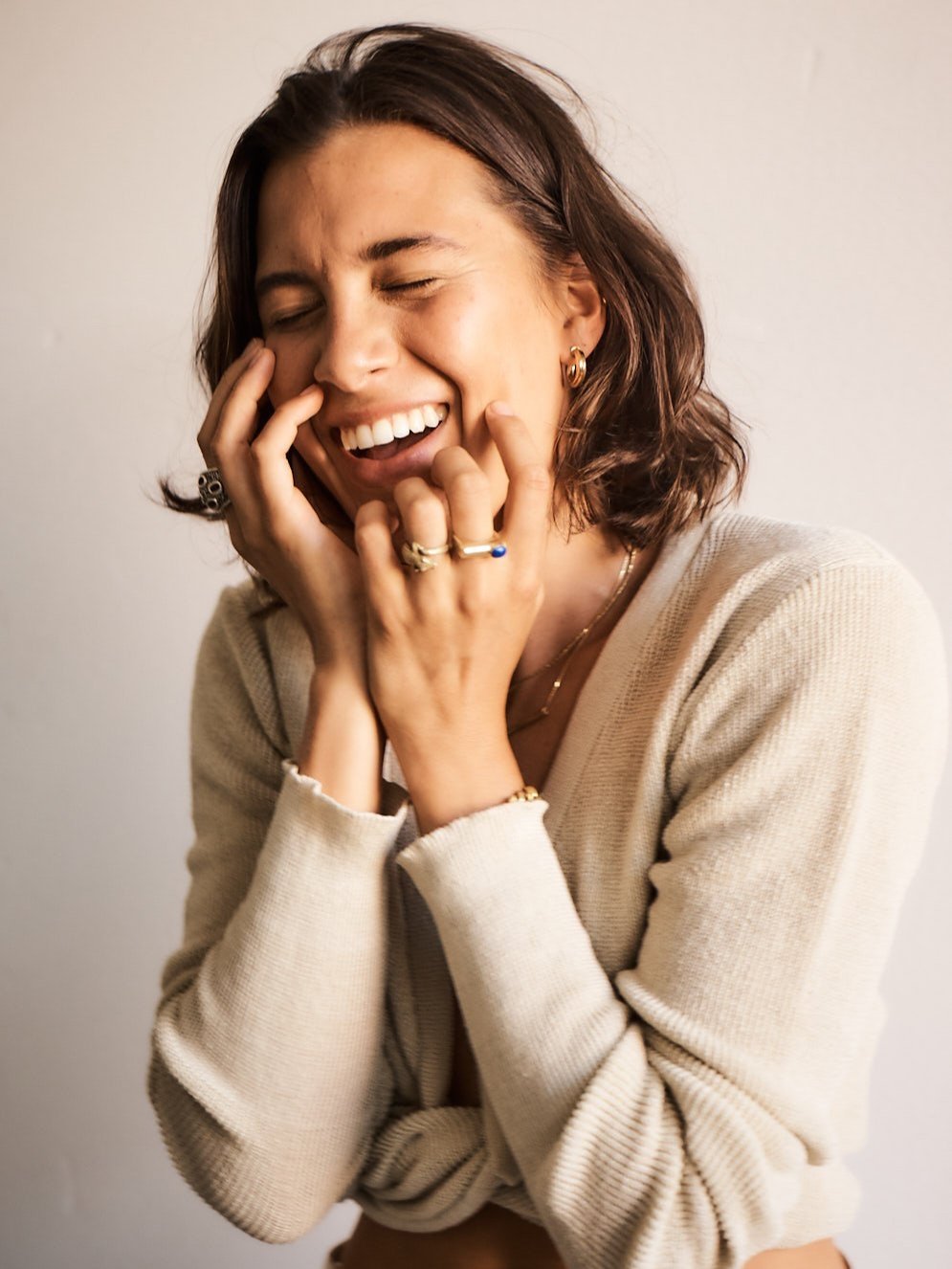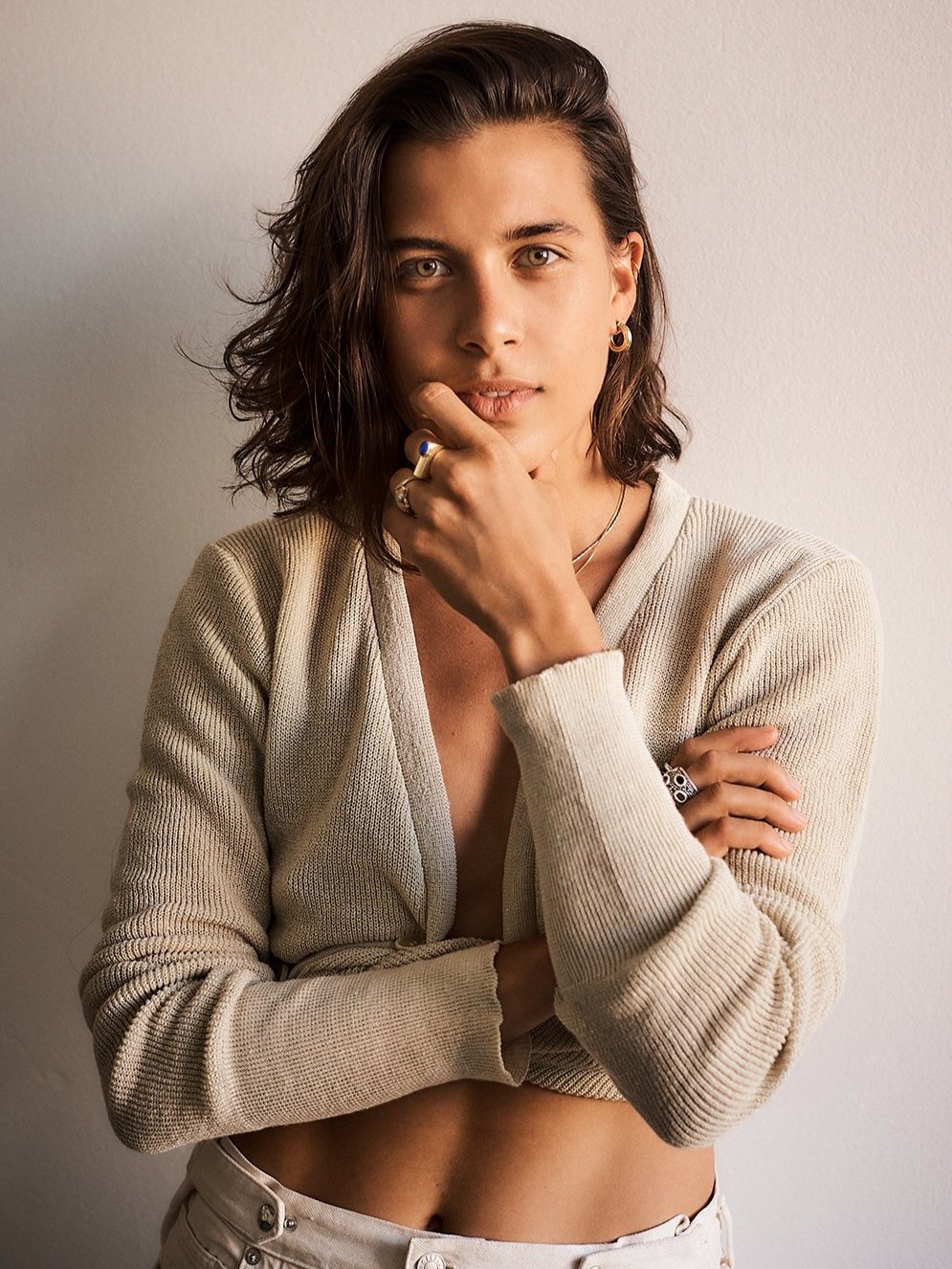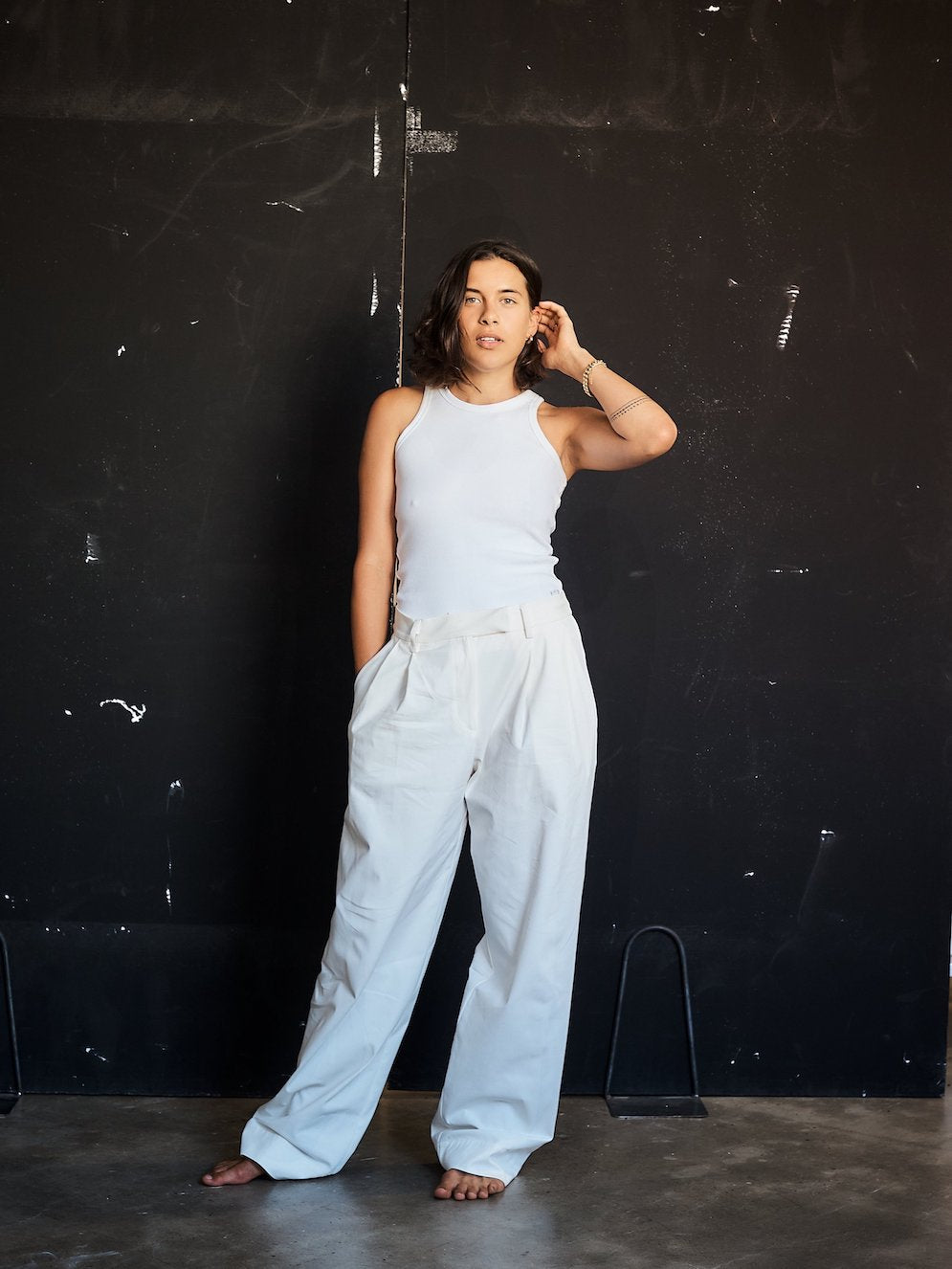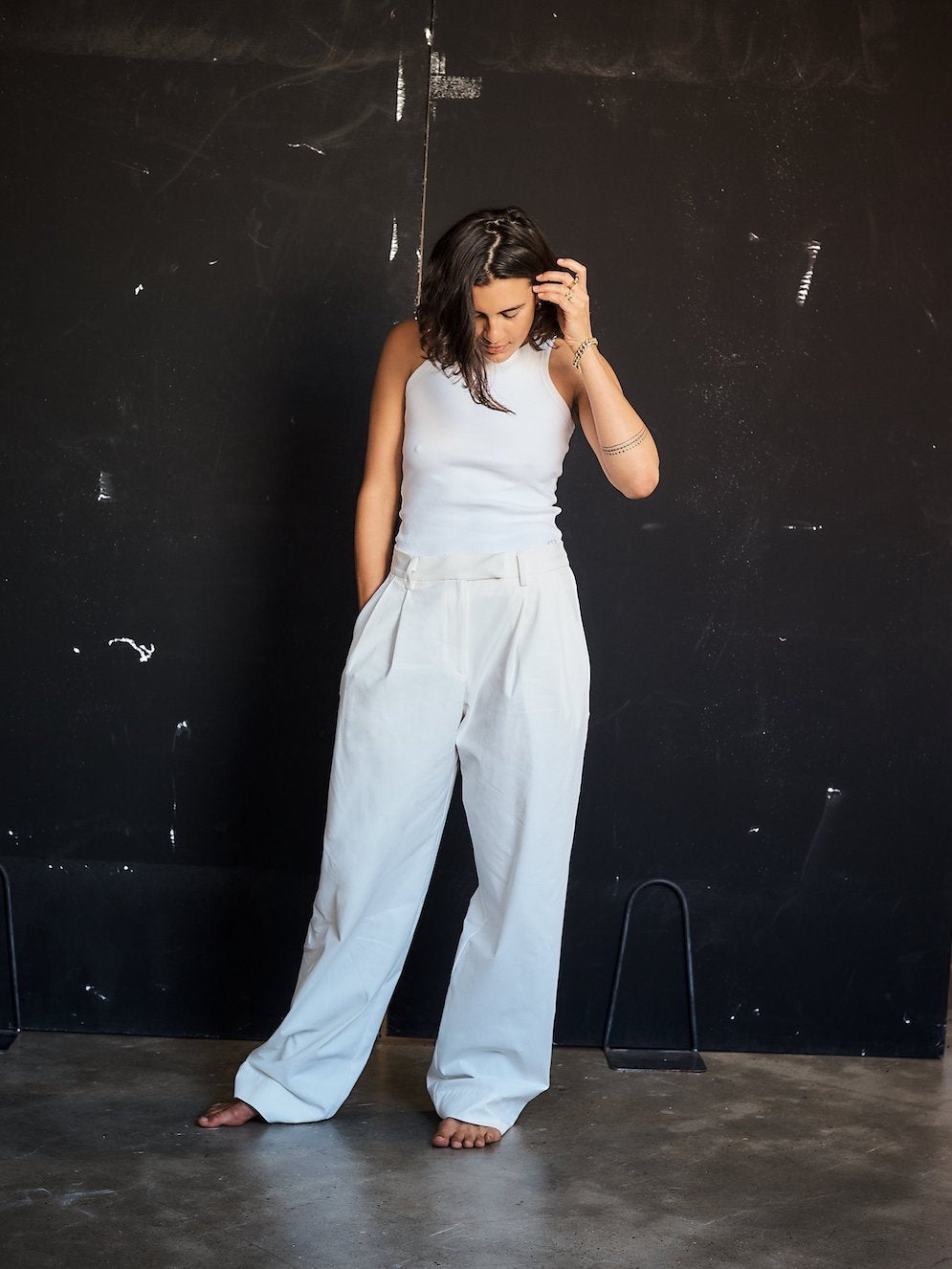

WELL LOVED WOMEN. NINA FITZGERALD
Hi beautiful Nina! Thank you for sharing with me for this debut edition of Well Loved Women, I am so grateful to have you. Please could you tell a little about yourself?
Thanks for having me! I am a Creative Director living and working from the tropical north in Darwin, my beloved home where I was also born and raised!
I am passionate about celebrating First Nations Australia, our stories, knowledge systems, and creative ingenuity, to drive meaningful agency and bridge the gaps in inequality between Indigenous and non-Indigenous Australia. Knowledge is power and I believe that new creative perspectives and storytelling are key to creating a more harmonious world.
I work in fashion, especially the growing Indigenous fashion and textiles space. This includes working with remote community Art Centre artists and those in more urban settings, from textile designers to traditional weaving artisans, to designers, to models and everything in between. It’s a dynamic and fun space, and the power of fashion for storytelling and engaging the masses is huge.
What was your upbringing and childhood like?
I was born and raised in Darwin, engulfed in the freedom of the laidback tropical lifestyle. As kids, we had so much space, spending our days left to our own devices, exploring the beaches, rainforests and parks, learning, exploring and getting up to mischief.
Darwin truly is a treasure of Australia - ridiculous in its randomness, exceptional in its beauty. It is a diverse cultural melting pot with people from all walks of life, representing many cultures and lived experiences - weathered cowboys or young professionals looking to fast track their careers, a pet crocodile in one backyard and a huge pig in another. You unlearn everything up here - to relearn, learn and keep learning.
It is also connected so closely to largely intact and diverse Indigenous populations and cultures. I am so lucky to have grown up surrounded by a big family, and extended indigenous community. I also spent lots of time in remote communities and grew up with an insight and understanding to life in the bush.
I am really interested in your experience moving from Darwin to Melbourne. I know you found it surprising the difference in attitudes and understanding of and towards Indigenous people and communities… In what way was that experience formative?
Growing up, Indigenous Australia was very visible, and I always knew, and was proud of, my own heritage. On my first day at Uni in Melbourne, someone said to me they had never met an Aboriginal person. The statement really shocked me. I didn’t understand why, or how, people made no effort to connect to Indigenous Australia, or just chose to ignore it.
This ignited a passion in me to share the stories of Indigenous Australia, particularly those of the remote places where few people really experience. The histories, lived experiences, challenges and resilience. The vibrance, beauty and ingenious creative output. I believe the inequalities faced by First Nations Australians could be hugely reduced if there was more understanding and empathy from the rest of the nation.
The whole of Australia, and the world, needs to embrace these stories and celebrate the unique diversity of the oldest living cultures on earth.
The last couple of years have been turbulent… What has this time of change been like for you?
For me 2020 meant returning home to Darwin after 8 years in Melbourne and exploring many corners of the globe.
Nowhere has truly felt like home to me like this place does - it’s so special to me. As is the Territory in general. I really love this place. I admire the beauty of both the people and the places - it’s so diverse with so much colour and movement. There’s truly no place as wild or wonderful the world over, and I feel incredibly lucky to be leading the life I am right now.
2020 also meant starting a new self-driven path in my career, and opening myself up to new opportunities, which has for the most part been incredibly rewarding. Now in 2022, I am really proud of the jobs I am landing and everything I am learning.
I know you love travelling around our beautiful country especially the more remote parts… What took you to the Yolngu community of Yirrkala and can you share a little about it?
Yirrkala is a special place for me. I first went there as a one-year old, where we attended a wedding of some family. I have returned many times since and love it more and more every time.
Negativity is often told of remote places however, there is so much beauty. Yirrkala is a powerful landscape of mesmerising contrast - vast bushland and red dirt, bordered by a coast of squeaky white sand beaches and iridescent blue ocean. And culture is incredibly strong. Age-old songlines connect the people and their country to co-exist with the modern era. Transported to another world, being here is a constant state of gratitude and awe.
The community itself is also home to one of the best Aboriginal Art Centres in the entire world - Buku Larrnguy Mulka Centre. The operation of the Art Centre is guided by the Yolgnu people who it represents, and this strong foundation undeniably accounts for its insane successes. Some of the most incredible and world renowned Aboriginal art comes from Buku, and being in the Art Centre is very inspiring to say the least.
In NZ, Waitangi day is the national celebration acknowledging the signing of a treaty between the British crown and over 500 Maori chiefs. A day of momentous significance that all kiwis celebrate together! In Australia, we don’t have treaties and we still have ‘Australia Day’ on a day of immense grief for First Nations. What does Jan 26th mean to you and what would you like to see come of it?
It’s a challenging question to answer in short. But for me I cannot celebrate a day that does not justly recognise the true history of this Country, and that set the course for so much continued inter-generational suffering for First Nations Peoples here. Ultimately, more still needs to be done to recognise and amend the issues still faced by many First Nations Australians.
But back to your question, if we can’t all celebrate together how can January 26th be our national day?
I think there are still some people who perceive the injustices faced by Indigenous Australians as stories from a bygone era and believe that today, things are a lot better and we should ‘just move forward’ etc. Could you speak to this?
In so many ways Australia has done very little. Still very lacking in its understanding and compassion towards its First Peoples there are still so many examples of how injustices are still very current and very real. The statistics are shameful. Lower life expectancy, highest rates of incarceration globally, higher infant mortality, lower levels of education…. to name a few.
Storytelling is crucially important in dismantling this feeling of ‘otherness’ that we can have towards those different from ourselves..
Crucial! And as I said earlier, Aboriginal and Torres Strait Islander Australia has countless interesting and rich stories. It begins with a very unique history, and is now moving into an increasingly contemporary and resilient output. I think lack of education to Aboriginal and Torres Strait Islander histories and lives, as well as ethnic and cultural diversity more generally, is a root for racism and injustices. So we need to start there.
I also believe in positivity and spreading love, and I believe in the ability of humans to have more compassion for one another. Maybe if we all did, and we opened our hearts and minds to the perspective of others, our world would be even brighter.
We love art! What is your favourite piece in your own home, and who are your favourite artists?
Hard! I like so many diverse art forms and artists - paintings, prints, sculpture, and I am a absolute sucker for woven baskets, bags and mats. Some favourites in my home right now are a limited edition screenprint and collagraph by Noŋgirrŋa Marawili and a couple of prints from a local Darwin artist Franck Gohier, as well as an array of baskets from remote community artisans across Arnhem Land.
What is your creative outlet and what gives you purpose and meaning?
I have multiple creative outlets. Being creative, leaning into, and being open to creativity, is super important for me. Equal parts exhilarating and calming, creativity is as much about problem solving as it is fun. To name a couple… I love photography - something so special about capturing and framing single moments in time. I also love cooking. I don’t think many consider it as creative but it has been creative outlet for me since I was so young.
I find purpose and meaning in being part of meaningful changes for Indigenous Australian lives and futures, and driving the changes that I want to see in the world I know. Sometimes the goals I set myself seem great, but each day is an opportunity to overcome them and move towards an even brighter future.
Finally, what are you working on, and thinking about now?
Right now I am:
Finalising an artist in residence programme I have been working on with the Ace Hotel Sydney.
About to open an Art Gallery in Darwin called Laundry Gallery, set in an iconic 70s Art Deco laundromat space.
Launching Fashioning the Future, a program I have developed to engage girls from remote communities and building confidence and new skills through creativity using fashion as the vehicle.
Working on a show and fashion capsule installation for Melbourne Fashion Week 2022.
Fun!



